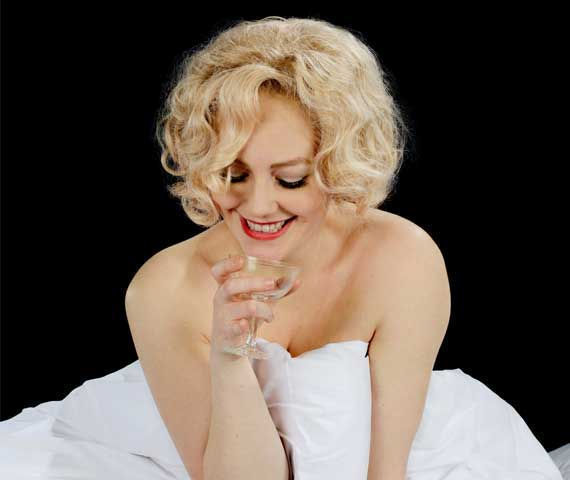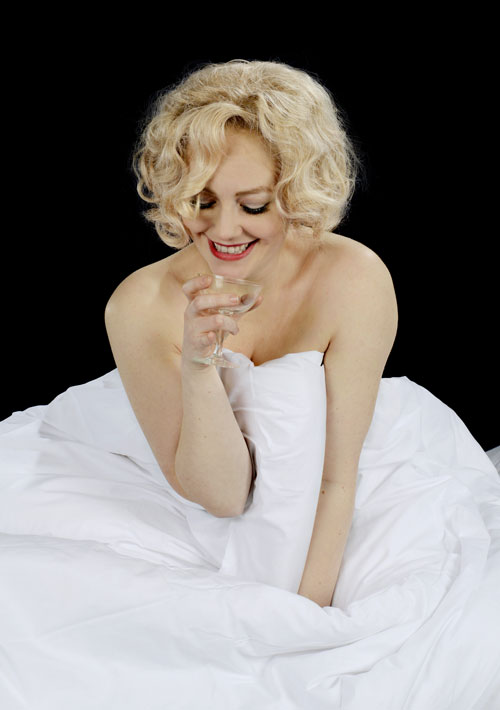
THIS is The Unremarkable Death Of Marilyn Monroe: August 5th, 1962. Marilyn as she has never been seen before: alone in her bedroom in a dressing gown and underwear; no glitz, no glamour, no masks.
So begins writer-director Elton Townend Jones’s play, presented by Dyad Productions on tour at Theatre@41, Monkgate, York, on Sunday night with Lizzie Wort in the role of Monroe.
Overdosed on pills, the woman behind the icon unravels her remarkable life and travels back through the memories of her closest relationships. Repeatedly stalked by a mysterious caller, the Hollywood icon tells all – Joe DiMaggio, Clark Gable, Arthur Miller, her mother – revealing a biting intelligence and an imperfect body, leading us in real time to the very moment of her death.
A five-star hit at the 2013 Edinburgh Fringe, The Unremarkable Death Of Marilyn Monroe comes from the St Albans company’s stable of touring shows such as Orlando; Jane Eyre: An Autobiography; Dalloway; Female Gothic; I, Elizabeth; The Diaries Of Adam And Eve; Christmas Gothic, The Time Machine and Austen’s Women.
Here, CharlesHutchPress puts questions to writer-director Elton Townend Jones and actor Lizzie Wort, previously seen on a York stage in the Theatre Royal and Tutti Frutti production of When We Lived In Uncle’s Hat in October 2010.
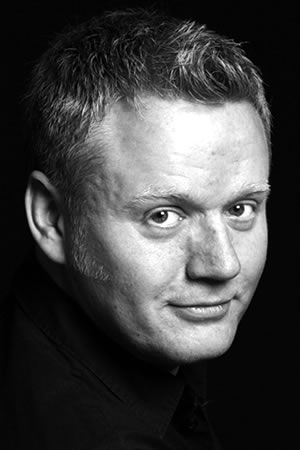
What hasn’t yet been said about and by Marilyn Monroe that still needs saying, Elton?
“Almost everything! The collective impression of Marilyn is a combination of dizzy blonde, untalented actor, bimbo, and victim of a convoluted and conspiratorial political death.
“The woman herself – the complex and intelligent troubled female behind the painted icon – is obscured not only by the circumstances of her death but also by her own on-screen persona.
“That said, it’s evident, if one takes a moment to look at movies like Some Like It Hot, The Misfits or The Prince And The Showgirl, that she’s a tremendously gifted actor, but The Unremarkable Death Of Marilyn Monroe is about the fascinating, likeable real person that seems to have been lost in all of that.
“However, it’s not really a play solely about Marilyn. Working backwards through time from the moment of her death, we travel through her entire life via her relationships and loves. It’s a play about love and how we share and express that emotion.
“But more than that, this is a piece about all of us – yes, a great focus on the female experience of life, but a piece about our private troubles; about how we treat and are treated by others; about kindness and how we don’t do enough of that; about how we grow, how we endure our pains and celebrate our pleasures. It’s a play about living, surviving, enduring and giving ourselves to others.
“In many ways, it’s autobiographical to me – and I drew on much of my own life experience and relationships to give Marilyn a ‘voice’.
“Many reviewers and audience members comment on the authenticity of the female experience I depict, and seem to marvel at my ability to have tapped in to that. That’s very flattering and humbling, but really, I just wrote myself into Marilyn.
“I don’t consider different thoughts and responses to certain events or moments in life as belonging to one gender or another. Marilyn’s story is everybody’s story – she’s just an ordinary person living in extraordinary circumstances – and the play, though peppered with dark and difficult moments, is ultimately inspirational and life affirming; optimistic.”
What above all else drew you to Marilyn’s story and why should you be the one to voice it?
“I became interested in Marilyn when I was a schoolboy in Yorkshire. Aged 12, I saw Some Like It Hot and read an article about her in a Sunday supplement that had been left in the art room for use in making collages.
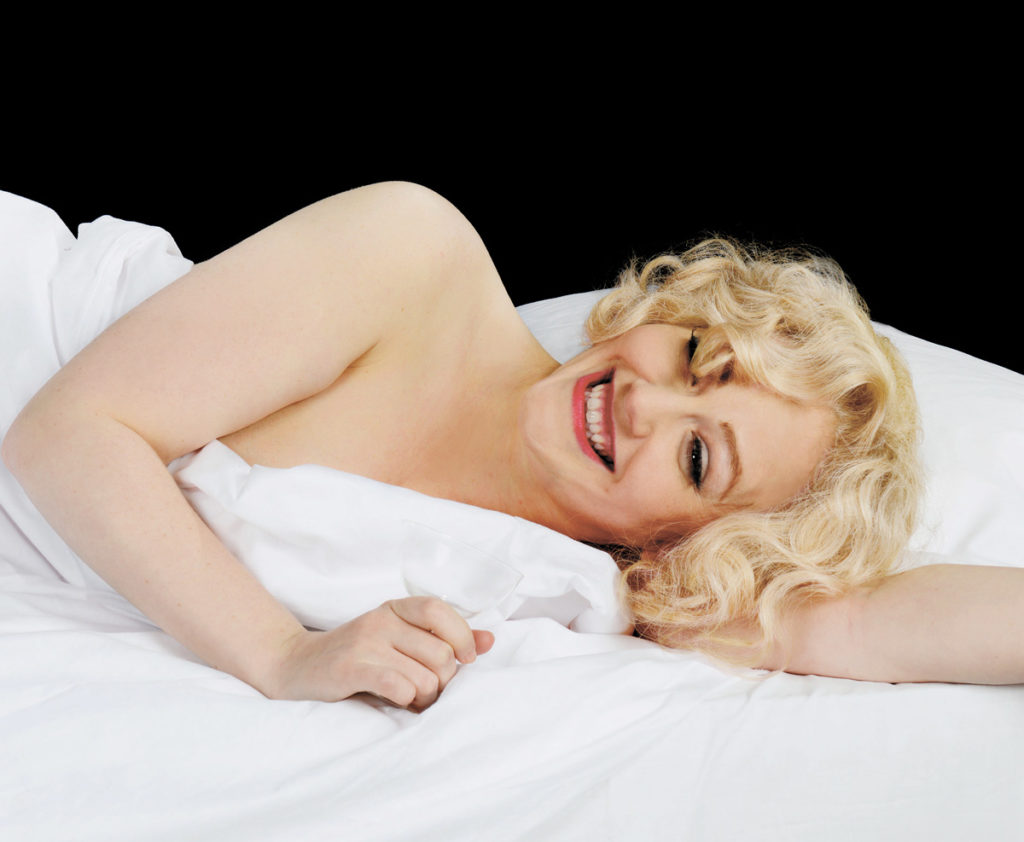
“From there, I read a few books and found myself identifying with the frailties of this fascinating and admittedly beguiling figure. I always suspected there was more going on under the surface that had yet to be revealed and knew – even at that early and naïve age – that I wanted to do some kind of theatrical representation of her; to investigate her and do justice to the truth of her.
“Fast-forward a generation and I’m a theatre director and I knew that I still had this itch to represent Marilyn on her terms and not the terms of the conspiracy theorists or her detractors. It’s called ‘The Unremarkable Death’, and the idea behind that really is that it’s a play about the inspirational, the positive – in spite of the many terrible and painful things she endured – a play about her ‘Remarkable Life’.
“It’s not her death that we should be focusing on: her life, her vivacity, her vulnerable but brilliant open- heartedness is bigger than that. There’s a lot to enjoy in this story, and a lot of comedy and laughter.”
Will Marilyn Monroe ever fade into the distance and be allowed to rest or will she be like those other ill-fated 20th century blondes/blonds, Diana, Princess of Wales and Kurt Cobain?
“I think her story has endured because of the myths and legends built around her death. Had she made it past 1962, she would have undoubtedly gone on to more significant movie work – perhaps not immediately, but there would certainly have been a revivalist interest in her as a performer and icon.
“One could imagine her turning up as an older, more seasoned actor in films by Cassavetes, Scorsese, Lynch and Tarantino even.
“Still, I think we’re at a very interesting transitional period of cultural history. The digital sphere is expanding beyond our ability to keep up with it, and I think we are beginning to gradually disconnect ourselves from much that was once culturally important or relevant.
“I think that within the next five to ten years, much of what we held up as iconic from the mid-20th century will be forgotten, which is an incredible shame, but that’s how we progress. I think we’ll be too busy dealing with other, more pressing matters than cultural nostalgia.
“But Marilyn’s story is currently still important – perhaps more important than we give it credit for. This piece was first written and performed almost a decade ago, but since then its relevance has increased, resonating with the #MeToo movement and other issues of inequality or institutional abuse and injustice perpetrated on women both in the celebrity sphere but also in ‘normal’ life.
“These are issues that the play takes great care to confront; these are issues that myself, the show’s producer, Rebecca Vaughan, and Dyad Productions are keen to explore and address in all our work.”
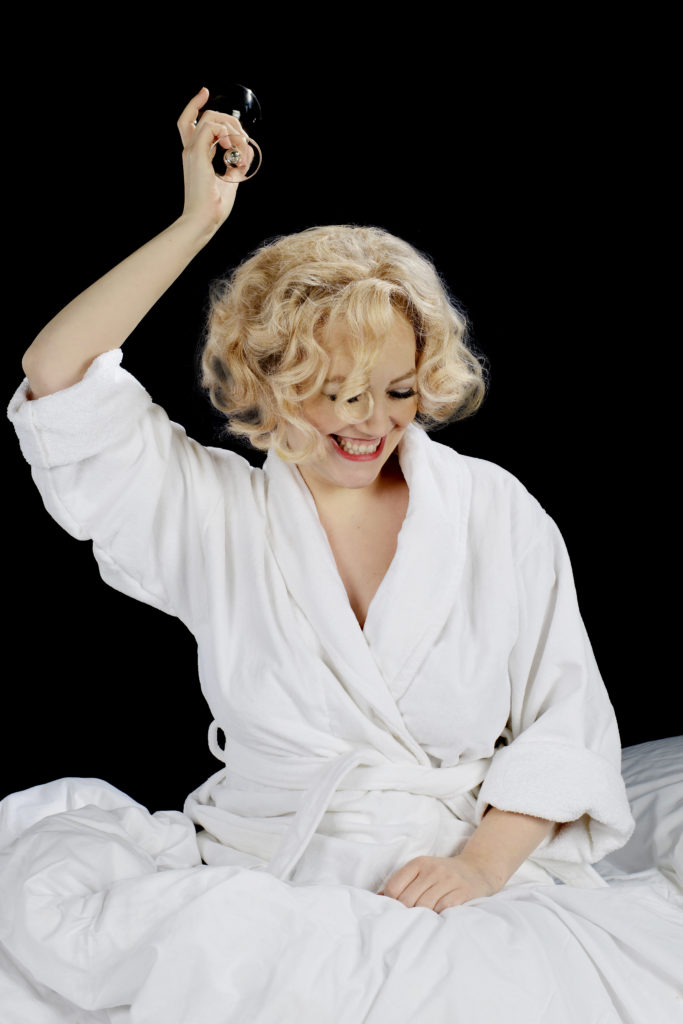
Marilyn’s death has forever been the subject of conspiracy theories. Are you pouring more fuel on that fire, like an Oliver Stone film might, or is there a different reason for giving Marilyn her voice here?
“As I’ve suggested, this play isn’t about any of that stuff. Yes, the Kennedys are mentioned and they form an important backdrop to the final hour of her life, but really that’s just context. This is a play about Marilyn Monroe and Marilyn Monroe only.
“Somebody else can write that conspiracy stuff, not me. Having done masses of research on her life and career, I was able to join the dots in a way that I don’t think anyone had before, finding a definite connection between the way she died, the lateness on set, the miscarriages, the colitis, the endometriosis, the childhood abuse.
“This is my reading of Marilyn. I’ve made connections – and they may not necessarily be correct, but they’re certainly compelling. It’s up to the audience to decide whether or not this is the definitive Marilyn.
“Let’s not forget that this is a work of fiction, so I do have creative and artistic licence, but everything in the play is based on true events and things she said and did.
“Having a skilled and hauntingly apposite actor like Lizzie Wort play Marilyn only adds to the play’s veracity. If nothing else, this is a powerful and emotionally resonant piece because of her performance.”
What do you love about Marilyn Monroe? The films? Everything else? The iconic imagery? The mystery? The too-soon snuffing out of the candle in the wind?
“The iconic imagery is important to me. I adore her ‘look’ in her final years. The older, more experienced, lived-in look. It appeals to me aesthetically. There’s life in those eyes. Things that can’t be unseen.
“She is a powerful icon across much of her Hollywood career, but I personally identify with the pained vulnerability of those later years and always have.
“As I said, I wrote myself into this play and I suppose I identify with Marilyn because my own past has its own legacy of abuse, heartbreak and loss. As Marilyn is burdened by the pain of her childhood experiences, so am I; for both of us, this has resonated into our adult lives, and I think there was something about this that I ‘felt’ intuitively when I was 12, but couldn’t articulate until I was a playwright in my 40s.
“And I love her movies, particularly everything from after she took classes at the Actors Studio: she is amazing in the intense drama of The Misfits and the unparalleled comedy of Some Like It Hot, which are, for my money, two of the best movies you’ll ever see. She’s simply remarkable.”
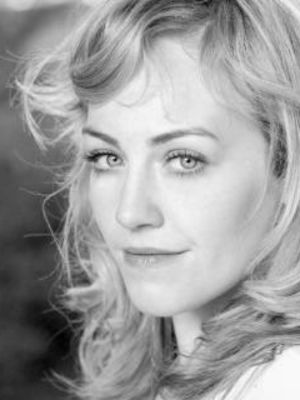
How did you create your characterisation of Marilyn Monroe, Lizzie? From Elton’s script; from research; from films and interviews?
“Elton was very clear from the beginning that he wanted us to find a Marilyn that of course was recognisable as the well-loved icon, but also had a different, previously unseen side to her. This was such a gift for me in terms of finding the characterisation.
“To be cast as such a huge icon felt intimidating at first, and potentially limiting, but being able to dig beneath the surface opened up so many possibilities for her and my understanding of her, which was hugely rewarding and exciting.
“I was able to use her films and interviews to find elements of her on-screen persona to bring to the part, but could also draw from Elton’s script, which gives her such a strong and articulate voice. There were times when watching her was incredibly useful and then times when I had to turn it all off and approach the part as a new person, as a regular woman, using my empathy for her and connecting my own personal life experiences.
“Elton has written such a tremendously well rounded, rich character, who is flawed, gets angry, is at times selfish, bitingly intelligent, wry, playful, warm and deeply soulful.
“It is a gift of a part. An absolute dream role. It also feels so relevant to women today. She was a female in a male industry in a time when women weren’t allowed a voice. And, sadly, that struggle continues. To finally give her that voice, and in doing so, give other women that chance too, was such an exciting process and journey of discovery.
“Her experiences are relevant still today and that played a large part in forming my characterisation of her.”
You are playing Marilyn at her final curtain – the Greek tragedy finale rather than the Hollywood rise and stumble – all alone at her 12305 Fifth Helena Drive home in Brentwood, Los Angeles. What are the principal challenges this scenario presents: the mortal versus the immortal?
“I would say this isn’t a Greek Tragedy finale either. It is indeed tragic, and we see her unravel as she reflects on her life, but it is also joyous and uplifting. It is full of hope and wit. She shines so brightly in this piece and her demise is all the more quiet and simple, once her story is truly understood. The play is about her life, finally, rather than focusing on the many possible ways she may or may not have died.”
Why are we endlessly fascinated by Marilyn Monroe?
“There are two elements to this. One is the endless fascination we have with celebrity in general. This is referenced in the play and she makes the point herself that we all invest in celebrity stories. We want to revel in other people’s lives. It’s a fascination that has existed for a long time now.
“Marilyn’s death was unexpected and far too early. To have a young, vibrant life cut short so suddenly was shocking. People feel that they know a person, feel they are connected to them, are invested in them. To lose them so early always feel tragic and unfathomable.
“The controversy surrounding her death and the fascination over how she died continues to this day. She was a hugely popular star, made all the more famous by her death, so this keeps her as an interesting character.
“But, of course, the fascination also goes beyond conspiracy. Marilyn was unusual. The more I have studied her, the more clearly I see how she was essentially always able to be many things to many people.
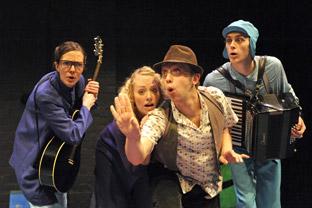
In Uncle’s Hat in 2010
“She had an effortless ability to draw people in. She instinctively knew how to capture people’s interest. How to charm people. She had the perfect blend of vulnerability and unbridled joy. She was hugely likeable. And that’s not actually an easy thing to accomplish as a Hollywood star. To be likeable in the truest sense. She was somehow approachable and relatable, while also being totally unobtainable.”
What is your favourite Marilyn film and film role and why?
“I adore The Misfits [1961]. She is just so raw and beautiful in it. I also love The Prince And The Show Girl [1957]. It’s not necessarily my favourite film, but her performance is utterly electric. She outshines [Laurence] Olivier.
“I always feel a sense of pride and excitement for her when I watch it. You can see her making different choices in it, from how she previously might have, earlier in her career. I find it thrilling to watch, knowing she was at the beginning of a new chapter of her career, having left The Actors Studio.”
What do you love about Marilyn Monroe? The films? Everything else? The iconic imagery? The mystery? The too-soon snuffing out of the candle in the wind?
“I love how strong she was. She endured so much as a child, as a young woman, from the industry, from the press, from men. She carried a huge amount of trauma within her, but still radiated warmth and joy.
“People talk a great deal about what she was feeling truly behind that beautiful big smile. I spent a lot of time studying photographs and looking at her eyes, that seemed to be saying something altogether different from her smile.
“It’s clear she covered up a lot of pain and sadness. Physical pain due to various health issues and also emotional struggles. However, I also believe she was a bright soul who genuinely adored life, adored people, had a thirst for knowledge, wanted to love and be loved.
“When someone goes through personal pain and grows up with traumatic experiences, it shapes who you are and the way you view and receive the world. It can sometimes enable a person to feel both sides of the coin.
“You can feel the pain and the torture of your experience existing deeply in your body and have a sense from childhood of the fragility of life. But, if you are lucky, that pain can also then give you an even greater appreciation of the beauty and joy of life all the more deeply. And I truly think she had that appreciation.
“It has been my favourite discovery about her. To realise that the golden Hollywood smile was actually real. Not because she was a one-dimensional blonde movie star who just smiled vacuously for the cameras. It was a smile that expressed all her pain and joy simultaneously.
“She understood life deeply. She felt it all deeply. I find that incredibly beautiful. And I think fundamentally THAT’S why we all love her. She radiated humanity. Heartbreak and joy in a single smile.”
Dyad Productions in The Unremarkable Death Of Marilyn Monroe, Theatre@41, Monkgate, York, October 10, 7.30pm. Box office: tickets.41monkgate.co.uk
